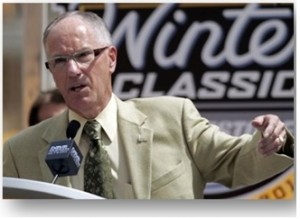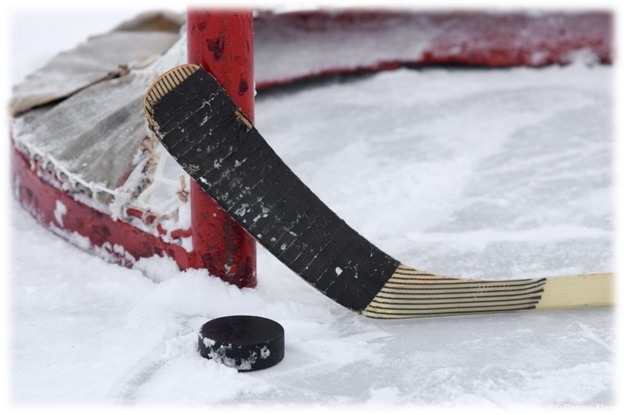 The NHL playoffs continue – at least for some teams. My Red Wings were knocked out in the first round, but the incredible art on ice continues. Today, Jacobs Media consultant and talent coach, Mike Stern, takes a look at one of the more unique and talented hockey craftsman – behind the mic. – FJ
The NHL playoffs continue – at least for some teams. My Red Wings were knocked out in the first round, but the incredible art on ice continues. Today, Jacobs Media consultant and talent coach, Mike Stern, takes a look at one of the more unique and talented hockey craftsman – behind the mic. – FJ
Being from Detroit originally, and now living in Chicago, I am lucky to have two great hockey teams to root for. While the Red Wings will always be nearest to my heart, I proudly root for the Blackhawks any time they aren’t playing Detroit. In fact, no one was happier when the division re-alignment split the two into separate conferences.
A side effect of rooting for two teams at this time of year is that you end up watching a lot of playoff hockey. In doing so, I have become a huge fan of NBC’s play-by-play commentator Mike “Doc” Emrick. While his style isn’t for everyone and can be even Yoda-like at times, you have to respect anyone who can talk about the same thing — a puck being passed around between players — for stretches of 20 minutes at a time.
Part of how Emrick keeps it interesting is by using a wide vocabulary. According to this USA Today article, Emrick used 153 different words to describe puck movement during this year’s USA versus Canada Olympic match. Some of my favorites from the list include: lugged, whacked and shuffleboarded as well as one he’s known for that isn’t on the list, “shillelaghed” – what happens when the puck is knocked down out of the air with a stick. Another fan was so moved by Emrick’s use of synonyms he remixed him over a Daft Punk song.
In addition to vocabulary gymnastics, Emrick finds ways to work in unique facts and musings as the game is being played. This Sports Illustrated piece captured some of his best quotes from this year’s Winter Classic between the Red Wings and Toronto Maple Leafs, played outdoors in a snowstorm at the University of Michigan football stadium – the Big House. Here are a few choice selections:
“This is a throwback to old times. We have professional athletes wearing an extra layer of clothing, just like they did when they were kids. One difference is their Mom called them into dinner and that ended the game. This one is governed by referees and a clock.”
“Water freezes at 32, the last report we had was 12 and the chill factor is now -1. The water bottles aren’t the only things freezing…”
“Three quarters of a century ago the eye black was created by a Washington Redskins football player, who then founded the company… Parents watching, in case your youngsters have now decided they want eye black all the time, I checked on the Internet: $14.95 for a tin.”
While some hockey fans find Emrick annoying, I didn’t write this post to debate his particular style. This is about lauding his creativity, attention to detail, and the prep it takes to discuss the same topic day after day, game after game, in segments that can last for many minutes between TV time outs.
Guys like Dick Vitale, Bob Ufer, and others became famous for sports announcing by standing out, turning the phrase, and injecting personality into a craft that is often approached mechanically by play-by-play guys just broadcasting another game.
 Unlike a Broadway performer who must execute the exact same script every night (and sometimes two shows a day) and do it with perfection and enthusiasm, Emrick’s challenge is a lot like what an on-air radio talent is up against every day – how to talk about the same music, the same station benefits, the same topics – and make it sound fresh and compelling. What’s different about today’s game, and how can you bring fans into the action and keep them tuned-in and involved?
Unlike a Broadway performer who must execute the exact same script every night (and sometimes two shows a day) and do it with perfection and enthusiasm, Emrick’s challenge is a lot like what an on-air radio talent is up against every day – how to talk about the same music, the same station benefits, the same topics – and make it sound fresh and compelling. What’s different about today’s game, and how can you bring fans into the action and keep them tuned-in and involved?
If Emrick can find enough stories and synonyms to make each hockey game a unique experience for the viewer, radio hosts should be able to make station promos and liners interesting. They should be able to take benchmark bits they do at 7:20 and 8:50 every day, and make them sound fresh and even surprising.
Perhaps the execution that is often heard on stations big and small comes from dictates that have diminished many DJs into becoming “card readers.” The audience can tell when a jock is rushing through copy, getting a contest promo out of the way, or even speeding through a weather report. How to make it different, interesting, relevant, and local are similar to the types of challenges that Emrick faces every time the puck is dropped on the ice.
A hockey period has a duration of 20 minutes plus stoppages in play while the average jock break lasts more like 90 seconds. Thinking about it through that lens, there’s no reason the station website, the mobile app or big contest promo that has to be read many times each day, every day shouldn’t be interesting and attention-getting every time. What are unique ways to keep this information fresh, to weave in stories about listeners, and to elevate the brand when promos are read?
Emrick might say that making the effort to grab the listener’s attention whenever the mic is open can play a major role in “shillelaghing” your ratings.
The turn of a phrase can make all the difference in captivating an audience or boring it to death.
Out-word them.
- What To Do If Your Radio Station Goes Through A Midlife Crisis - April 25, 2025
- A 2020 Lesson?It Could All Be Gone In A Flash - April 24, 2025
- How AI Can Give Radio Personalities More…PERSONALITY - April 23, 2025





Well-written, about an unusually talented character (and Emrick is nothing, if not a character) with a nice Radio related slap-shot at the end. He scores!
Thanks Lindsay. Now let’s see if we can make a glove save on boring radio.
Bravos, Mike. Deft and cogent. Your Broadway metaphor is spot-on. The great Kevin Spacey likened treading the boards to tennis – rules of the game remain the same yet every match is different.
Thanks Dave. Spacey is right, every match is different and every radio show should be.
Excellent write-up, Mike! I love Doc. He’s got an unbelievable feel for the action, the timing of everything and, yes, his vocab is second to none. He knows when to let his color analyst step in to break it down, he knows how to describe the scene and lay it all out in front of you and he knows when it’s time to get excited. I’d be interested to hear him call a hockey game on radio, as opposed to TV. He might not take a breath!
Thanks Tom. I really look forward to hearing him call a game. He makes every one a unique experience. And yes, hearing him do a game on radio would be a fascinating experiment.
Awesome read Mike. Love Doc’s style. Great analogy
Thanks DP. Appreciate the kind words.